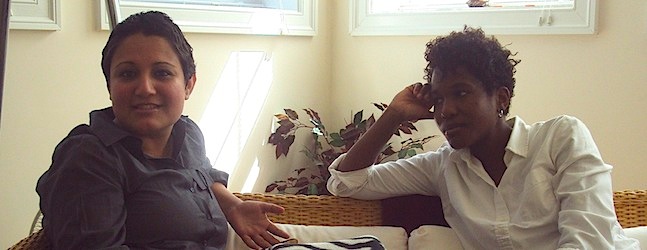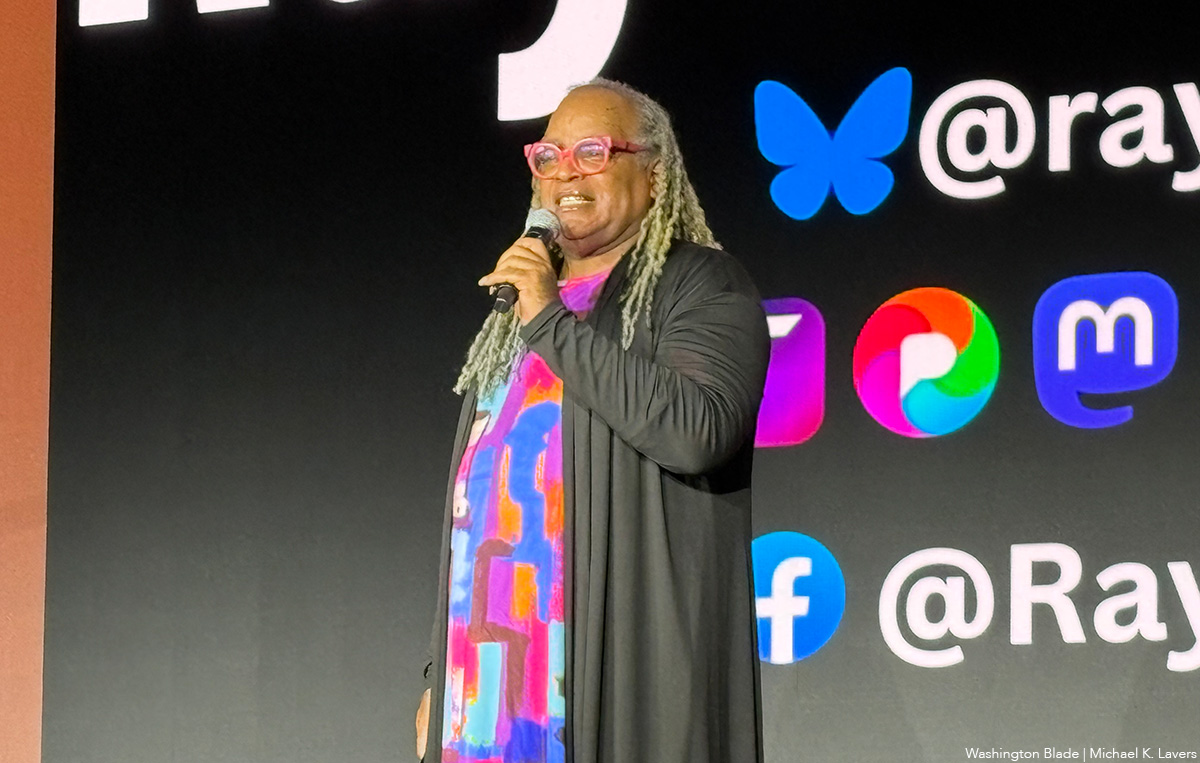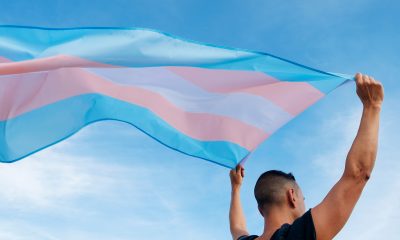Local
‘I’m not going to cry about this’
Friends rally for Va. couple saving for prosthesis after cancer claims woman’s leg


Zunaira Khalid (left) and her partner Ebony Bates in their basement apartment in Khalid's parents' house in Chantilly, Va. The couple says they're lucky most of the medical expenses from the June cancer surgery that claimed Khalid's leg were covered by insurance but only a small percentage will be covered for the prosthetic leg Khalid needs. (Washington Blade photo by Joey DiGuglielmo)
Zunaira Khalid benefit
Thursday at Policy
6:30 to 10 p.m.
Go here to make a donation.
Things were going pretty well for Zunaira Khalid and Ebony Bates in December. They’d had rough spots large and small throughout their nine-year relationship such as years of separation while Bates went to college in her native Pennsylvania, some occasional minor clashes that are inevitable in cross-cultural romances and all the usual pings and pangs that come and go as young people figure out what they want and don’t want from life.
But by the end of last year Khalid, a 35-year-old aspiring doctor and native Pakistani Muslim who’s been in the U.S. since age 12, and Bates, a 29-year-old Washington, Pa., native, realized their lives were beginning to jell. In October Bates landed what she calls her “dream job” with a government agency. She declines to say which because she says it’s not terribly gay friendly.
And after years of dabbling in various fields, Khalid, who’d drifted after finishing medical school questioning if she really wanted to be a doctor, decided medicine was her calling and she was in the uphill battle of getting back into the rigors of a residency program. Since 2005, the couple has lived in the basement of Khalid’s parents’ sprawling Chantilly, Va., home.
The two had been without health insurance for years. Bates was in school most of the ’00s doing undergrad and graduate work and Khalid had been unemployed for years studying to pass an exam to get back into medicine. The two had met in 2001 working together at Dulles Airport.
By December, Bates had coverage through her job. It took some arm twisting, but she convinced Khalid they needed to buy her some too, just in case. They found a decent plan for a little more than $100 per month through Aetna Health Insurance, an extraordinarily fortuitous decision on Bates’ part that saved the couple from financial ruin when Khalid got sick in February with an aggressive form of cancer that resulted in her leg having to be amputated in June.
“We were to the point where we’d been committed for several years,” Khalid says. “It’s almost impossible to have any sort of relationship recognition in Virginia, so that was never really discussed, but after D.C. passed marriage in December and then Ebony got a job she was like, ‘Look, we have a little money now, let’s get you a health plan. I didn’t think it was big deal. I don’t really get the flu or anything acute very often. I was like, ‘I’m fine, I don’t need it,’ but she was really adamant.”
To Khalid, she and Bates both burdened with considerable student loan debt, it seemed like one more expense. But she acquiesced and had an exam in December and got a clean bill of health.
The first signs of the cancer came innocuously in February. Khalid noticed her jeans felt tight around her left leg and took a bit of effort to get on. When it persisted, she had it looked at and was diagnosed with a pulled muscle. Just give it time to heal on its own, doctors told her. When it didn’t, she returned and an ultrasound found a cyst growing behind her knee. A biopsy revealed the mass was an aggressive sarcoma that was spreading fast. The situation quickly grew dire. It had grown from the size of a golf ball when an initial ultrasound was done to the size of a baseball a month later when an MRI was performed on Feb. 27.
Doctors told Khalid and Bates they were going to do everything they could to save her life and save her leg. It quickly became clear how potentially serious the diagnosis was.
“I remember when they said they were going to try to save her life first but we can’t guarantee that, that was really jarring for me,” Bates says. “Here they were talking about the possibility of death and if we were lucky she would make it through. It was just a lot of bad news at once.”
Bates, under pressure at her new job and in a probationary period where she knew she had to perform at her best, decided she needed to come out to her boss and explain the situation in case the stress started showing up in her performance. She was only able to miss a few days of work throughout Khalid’s illness, a point that irks the couple who marvel at the provisions that would be available if they were a married, opposite-sex couple.
But the couple opted to focus on the positive — most glaringly that Bates had the foresight to insist on an insurance plan for Khalid.
The first treatment step was two debilitating rounds of chemo, which destroyed Khalid’s immune system and put her in the hospital at Washington Hospital Center in D.C.’s Pleasant Plains neighborhood for weeks at a time. The chemo took such a toll — Khalid’s doctor told her he’d never seen anybody react so aversely to it — that a third round would have been too much for her body to handle. It was also unsuccessful at shrinking the mass to a degree doctors felt was acceptable.
There were essentially three problems with the growth — it had grown around a nerve meaning removing the mass would likely have resulted in Khalid having no control of her leg. Secondly it was so close to the bone, operating would be difficult and would have required, thirdly, a new route for blood supply to the leg, another iffy proposition considering the mass’s location. Amputation became the only safe option.
“I just realized very quickly that was the best decision I could make,” Khalid says. “I’d kind of prepared myself for it emotionally when they first told me it was a possibility. That first weekend, Eb had to be in Pennsylvania for work and I decided to go with her. It was the best thing. She was busy with work stuff but I just shopped, hung out at the hotel and really had time to make my peace with it.”
Bates soldiered on at work and says a strong relationship with Khalid’s parents — she says they treat her as if she, too, were their daughter — helped tremendously.
“Anytime I thought about how hard it was to juggle this with work, I just realized how much easier I had it compared to what she was going through,” Bates says.
Khalid is doing well now. She gets around on a pair of crutches cushioned with zebra-patterned covers. She was up and walking with a walker the day after her surgery. And she can still drive since she only needs to use her right leg.
The pain, though, has been excruciating at times. Muscle in her leg was essentially “wrapped” around hollow bone resulting in cookie-cutter like pressure from the bone’s edges. Khalid also experiences “phantom” pain where it feels as if her leg is still there, causing both pain and itching sensations.
“Basically the nerves have been cut but up here,” she says, pointing to her head, “it thinks everything is normal. So the nerves are freaking out and they don’t know what happened.”
She’s also stumbled several times as she attempts to get around.
The couple’s biggest challenge now is affording a massively expensive prosthetic leg for Khalid. The Aetna plan they chose has been great at kicking in thousands of dollars toward her chemo and surgery expenses but comes up far short on the cost of the prosthesis. The couple says it will cover only about $2,000 of the estimated $40,000 to $45,000 cost.
Friends are rallying. D.C. lesbian event promoter Ebone Bell has set up a website seeking contributions. Another lesbian friend, Darcy O’Callaghan, is planning an event Thursday at Policy for the couple. Donations are being accepted here.
Khalid says she’s keeping the stiff upper lip she’s maintained all along.
“I just decided up front I’m not going to cry about this,” she says. “I refuse to cry and give into this. If I have cried, it hasn’t been because of this stupid cancer, but because I’ve been touched by the things people have done for me.”
Local
Local LGBTQ groups, activists to commemorate Black History Month
Rayceen Pendarvis to moderate Dupont Underground panel on Sunday

LGBTQ groups in D.C. and elsewhere plan to use Black History Month as an opportunity to commemorate and celebrate Black lives and experiences.
Team Rayceen Productions has no specific events planned, but co-founder Rayceen Pendarvis will attend many functions around D.C. this month.
Pendarvis, a longtime voice in the LGBTQ community in D.C. will be moderating a panel at Dupont Underground on Sunday. The event, “Every (Body) Wants to Be a Showgirl,” will feature art from Black burlesque artists from around the country. Pendarvis on Feb. 23 will attend the showing of multimedia play at the Lincoln Theatre that commemorates the life of James Baldwin.
Equality Virginia plans to prioritize Black voices through a weekly online series, and community-based story telling. The online digital series will center Black LGBTQ voices, specifically trailblazers and activists, and contemporary Black queer and transgender people.
Narissa Rahaman, Equality Virginia’s executive director, stressed the importance of the Black queer community to the overall Pride movement, and said “Equality Virginia is proud to center those voices in our work this month and beyond.”
The Capital Pride Alliance, which hosts Pride events in D.C., has an alliance with the Center for Black Equity, which brings Black Pride to D.C. over Memorial Day weekend. The National LGBTQ Task Force has no specific Black History Month events planned, but plans to participate in online collaborations.
Cathy Renna, the Task Force’s director of communications, told the Washington Blade the organization remains committed to uplifting Black voices. “Our priority is keeping this at the forefront everyday,” she said.
The D.C. LGBTQ+ Community Center is also hosting a series of Black History Month events.
The D.C. Public Library earlier this year launched “Freedom and Resistance,” an exhibition that celebrates Black History Month and Martin Luther King Jr. It will remain on display until the middle of March at the Martin Luther King Jr. Memorial Library at 901 G St., N.W.
District of Columbia
U.S. Attorney’s Office drops hate crime charge in anti-gay assault
Case remains under investigation and ‘further charges’ could come

D.C. police announced on Feb. 9 that they had arrested two days earlier on Feb. 7 a Germantown, Md., man on a charge of simple assault with a hate crime designation after the man allegedly assaulted a gay man at 14th and Q Streets, N.W., while using “homophobic slurs.”
But D.C. Superior Court records show that prosecutors with the Office of the U.S. Attorney for D.C., which prosecutes D.C. violent crime cases, charged the arrested man only with simple assault without a hate crime designation.
In response to a request by the Washington Blade for the reason why the hate crime designation was dropped, a spokesperson for the U.S. Attorney’s office provided this response: “We continue to investigate this matter and make no mistake: should the evidence call for further charges, we will not hesitate to charge them.”
In a statement announcing the arrest in this case, D.C. police stated, “On Saturday, February 7, 2026, at approximately 7:45 p.m. the victim and suspect were in the 1500 block of 14th Street, Northwest. The suspect requested a ‘high five’ from the victim. The victim declined and continued walking,” the statement says.
“The suspect assaulted the victim and used homophobic slurs,” the police statement continues. “The suspect was apprehended by responding officers.”
It adds that 26-year-old Dean Edmundson of Germantown, Md. “was arrested and charged with Simple Assault (Hate/Bias).” The statement also adds, “A designation as a hate crime by MPD does not mean that prosecutors will prosecute it as a hate crime.”
Under D.C.’s Bias Related Crime Act of 1989, penalties for crimes motivated by prejudice against individuals based on race, religion, sexual orientation, gender identity, disability, and homelessness can be enhanced by a court upon conviction by one and a half times greater than the penalty of the underlying crime.
Prosecutors in the past both in D.C. and other states have said they sometimes decide not to include a hate crime designation in assault cases if they don’t think the evidence is sufficient to obtain a conviction by a jury. In some instances, prosecutors have said they were concerned that a skeptical jury might decide to find a defendant not guilty of the underlying assault charge if they did not believe a motive of hate was involved.
A more detailed arrest affidavit filed by D.C. police in Superior Court appears to support the charge of a hate crime designation.
“The victim stated that they refused to High-Five Defendant Edmondson, which, upon that happening, Defendant Edmondson started walking behind both the victim and witness, calling the victim, “bald, ugly, and gay,” the arrest affidavit states.
“The victim stated that upon being called that, Defendant Edmundson pushed the victim with both hands, shoving them, causing the victim to feel the force of the push,” the affidavit continues. “The victim stated that they felt offended and that they were also gay,” it says.
District of Columbia
Capital Pride wins anti-stalking order against local activist
Darren Pasha claims action is linked to his criticism of Pride organizers

A D.C. Superior Court judge on Feb. 6 partially approved an anti-stalking order against a local LGBTQ activist requested last October by the Capital Pride Alliance, the D.C.-based LGBTQ group that organizes the city’s annual Pride events.
The ruling by Judge Robert D. Okun requires former Capital Pride volunteer Darren Pasha to stay at least 100 feet away from Capital Pride’s staff, board members, and volunteers until the time of a follow up court hearing he scheduled for April 17.
In his ruling at the Feb. 6 hearing, which was virtual rather than held in-person at the courthouse, Okun said he had changed the distance that Capital Pride had requested for the stay-away, anti-stalking order from 200 yards to 100 feet. The court records show that the judge also denied a motion filed earlier by Pasha, who did not attend the hearing, to “quash” the Capital Pride civil case against him.
Pasha told the Washington Blade he suffered an injury and damaged his mobile phone by falling off his scooter on the city’s snow-covered streets that prevented him from calling in to join the Feb. 6 court hearing.
In his own court filings without retaining an attorney, Pasha has strongly denied the stalking related allegations against him by Capital Pride, saying “no credible or admissible evidence has been provided” to show he engaged in any wrongdoing.
The Capital Pride complaint initially filed in court on Oct. 27, 2025, includes an 18-page legal brief outlining its allegations against Pasha and an additional 167-page addendum of “supporting exhibits” that includes multiple statements by witnesses whose names are blacked out.
“Over the past year, Defendant Darren Pasha (“DSP”) has engaged in a sustained, and escalating course of conduct directed at CPA, including repeated and unwanted contact, harassment, intimidation, threats, manipulation, and coercive behavior targeting CPA staff, board members, volunteers, and affiliates,” the Capital Pride complaint states.
In his initial 16-page response to the complaint, Pasha says the Capital Pride complaint appears to be a form of retaliation against him for a dispute he has had with the organization and its then president, Ashley Smith, last year.
“It is evident that the document is replete with false, misleading, and unsubstantiated assertions,” he said of the complaint.
Smith, who has since resigned from his role as board president, did not respond to a request by the Blade for comment at the time the Capital Pride court complaint was filed against Pasha.
Capital Pride Executive Director Ryan Bos and the attorney representing the group in its legal action against Pasha, Nick Harrison, did not immediately respond to a Blade request for comment on the judge’s Feb. 6 ruling.














